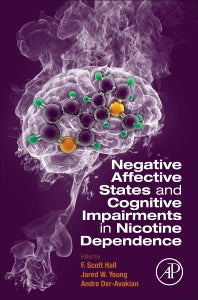Freshly Printed - allow 10 days lead
Couldn't load pickup availability
Negative Affective States and Cognitive Impairments in Nicotine Dependence
As the first resource of its kind to examine the negative reinforcement mechanisms and psychiatric comorbidities associated with nicotine use and abuse, this book addresses these negative reinforcement mechanisms and presents animal models researchers can utilize to examine these dysfunctions’ biological bases
F. Scott Hall (Edited by), Jared W. Young (Edited by), Andre Der-Avakian (Edited by)
9780128025741
Hardback, published 9 September 2016
362 pages
22.9 x 15.1 x 2.5 cm, 0.72 kg
"…provides a unique perspective on nicotine dependence from a clinical and preclinical perspective focusing on negative reinforcement rather than positive reinforcement, the role of withdrawal states as motivating for continued use, and genetics and multineurotransmitter effects on use and withdrawal. Score: 83 - 3 Stars" --Doody's
Negative Affective States and Cognitive Impairments in Nicotine Dependence is the only book of its kind that addresses nicotine use and abuse in the context of negative reinforcement mechanisms. Written and edited by leading investigators in addiction, affective, genetic, and cognitive research, it provides researchers and advanced students with an overview of the clinical bases of these effects, allowing them to fully understand the various underlying dysfunctions that drive nicotine use in different individuals. In addition, this book examines animal models that researchers have utilized to investigate the biological bases of these dysfunctions. The combination of clinical and preclinical approaches to understanding nicotine dependence makes this book an invaluable resource for researchers and practitioners seeking to develop targeted treatments aimed at ameliorating symptoms of nicotine dependence, as well as identifying premorbid differences in affective or cognitive function.
1. Overview of Nicotine Withdrawal and Negative Reinforcement (Preclinical). Olivier George and George F. Koob. 2. Nicotine withdrawal and attentional deficit studies across species: Conflation with attentional dysfunction in psychiatric patients. Jordy van Enkhuizen and Jared W. Young. 3. Preclinical models of nicotine withdrawal: targeting impaired cognition. Mohammed Shoaib and F. Scott Hall. 4. Genetic, developmental, and receptor level influences on nicotine withdrawal-associated deficits in learning. Munir G. Kutlu, Erica Holliday and Thomas J. Gould. 5. Enhanced tobacco use vulnerability in adolescents, females and persons with diabetes. Joseph A Pipkin, Tiahna Ontiveros and Laura E. O’Dell. 6. Detrimental effects of prenatal exposure to tobacco smoke and nicotine. Tomasz Schneider. 7. Contribution of mouse genetic models to our understanding of nicotine dependence. F. Scott Hall, Yosefu Arime, Yasir Saber and Ichiro Sora. 8. Transmitters and receptors in nicotine withdrawal syndrome. David H. Malin, Andrea N. Anderson and Pilar Goyarzu. 9. The cannabinoid system in nicotine dependence and withdrawal. Meghan E. Mcilwain, Arpi Minassian, and William Perry. 10. Critical role for brain stress systems in the negative affective state associated with nicotine withdrawal. Xiaoli Zi, Dawn M. Bruijnzeel, and Adriaan W. Bruijnzeel. 11. The habenula-interpeduncular pathway and nicotine withdrawal. Christie D. Fowler. 12. A Clinical overview of nicotine dependence and withdrawal. Mai Frandsen, Mona Thorpe, Saul Shiffman, and Stuart G. Ferguson. 13. Epidemiologic research on the relationship of nicotine dependence to psychiatric and substance use disorders. Kate S. Segal, Hannah Esan, Alyssa R. Burns, and Andrea H. Weinberger. 14. Nicotine and tobacco smoking and withdrawal in schizophrenia. Karolina Kozak and Tony P. George. 15. Emergent cognitive impairment during early nicotine withdrawal. Randi M. Schuster and A. Eden Evins. 16. Nicotine and posttraumatic Stress Disorder. Dean T. Acheson and Daniel E. Glenn. 17. Nicotine withdrawal and depression: Clinical studies – a four-factor model for more accurate characterization. David G. Gilbert and Michel L. Pergadia. 18. Neuroimaging insights into the multifaceted nature of the nicotine withdrawal syndrome. Matthew T. Sutherland, Julio A. Yanes, and Elliot A. Stein.
Subject Areas: Neurosciences [PSAN], Addiction & therapy [MMZR], Cognition & cognitive psychology [JMR], Experimental psychology [JML]


